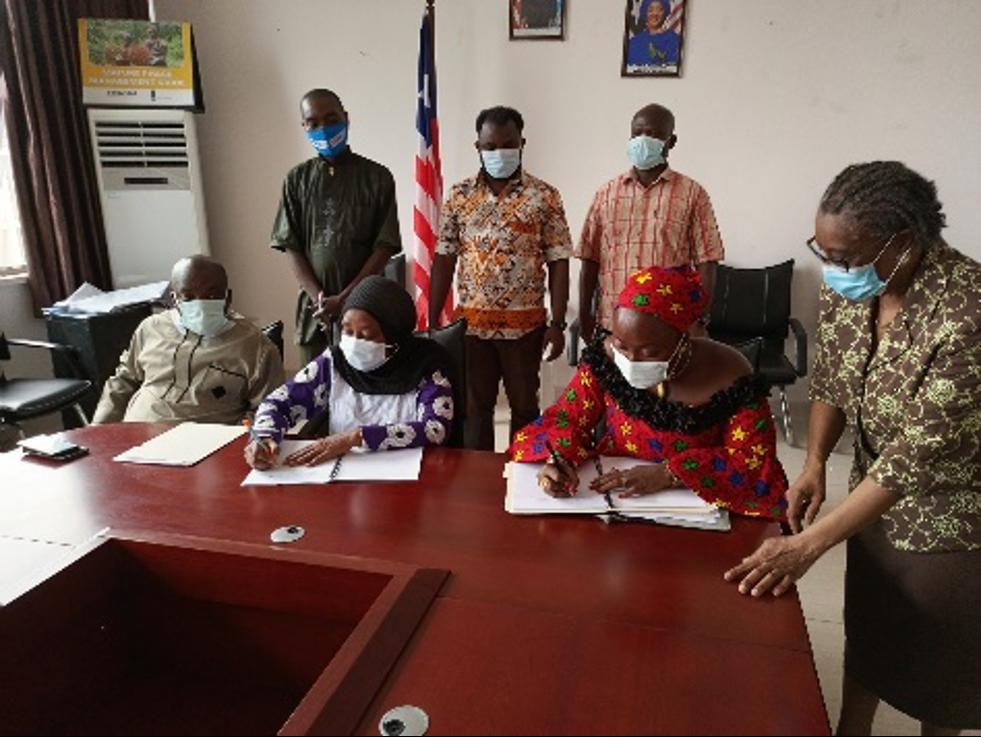
Africa-Press – Liberia. The Food and Agriculture Organization of the United Nations has signed a partnership agreement for the implementation of Technical Cooperation Programme (TCP) with the Ministry of Agriculture in Liberia. The TCP agreement is funding a project titled: Enhancing the national abattoir system and strengthening the productive capacity of rural smallholder producers in Liberia.
Speaking at the signing ceremony, the FAO Representative in Liberia, Ms. Mariatou Njie said the project was formulated in response to a request received from the Ministry of Agriculture to provide technical assistance to strengthen the National Abattoir System and to facilitate improving capacities at two integrated (poultry and vegetables) model gardens, and additional two vegetable gardens situated at Tumutu, Bong County and Salayea, Lofa County.
She furthered that the project has two objectives: (i) Provision of technical support to the Ministry of Agriculture and actors to strengthen the national abattoir system. (ii) Enhancement of sustainable production, value addition and marketing capacities for smallholder vegetable and poultry producers.
In elucidating the objectives, the FAO Representative stated livestock (sub) sector plays an important role in providing direct food production in terms of meat and milk and does represent a major activity in Liberia, like many other developing areas in Africa. Therefore adequate animal slaughtering and meat inspection system is critical for both the public health protection purpose and market opportunity creation.
‘’Unfortunately, the National Abattoir System in Liberia is not adequate and not in use and the meat processing and inspection system continues to face significant challenges in terms of availability of adequate slaughter facilities and capacity to implement Good Manufacturing Practices (GMPs) and Good Hygienic Practices (GHPs). Currently, the country has only one public slaughterhouse located in Monrovia and four slaughter slabs in counties of Nimba, Lofa, Bong, and Margibi. None of these establishments is able to meet standard hygiene requirements’’ said the FAO Representative in Liberia.
It is therefore against this backdrop that the TCP project was formulated and intends to construct and equip slaughterhouses that will provide opportunity for inspection and evaluation for fitness for human consumption as it allows checking the live animals on arrival as well as the carcasses and other parts such as organs of the slaughtered animals.
According to the project document, the second objective seeks to support the development of smallholder productivity in vegetable and poultry since 2020. However, the outbreak of the COVID-19 pandemic negatively impacted the overall programme delivery of two joint UN programme to about 1,000 rural women and youths in three counties. Some key activities under these programmes were not fully completed due to the dual challenge of limited time and inadequate resource allocation.
In terms of delivery schedule, key activities that precede critical construction of irrigation system delayed largely due to government-imposed restrictions on movement as a result of the COVID-19 pandemic; thus affecting labor, international supply chain and logistics for procurable items, and travels to field sites, during the half of 2020 and again during the quarter in mid-2021, as the new COVID variant surfaced in Liberia.
In addressing those pending activities, the project will facilitate the completion of the remaining activities which includes solar operated water irrigation systems at four vegetable gardens centers and to train beneficiaries on improved poultry production, using a two-month residency-based training of trainers (ToT), through a poultry value chain facility.
The project will be implemented over a period of 24 month commencing this February with a total budget of $335,000.
‘’I am pleased to note the close alignment of the project with the PAPD Pillar II and with FAO’s strategic objectives 4: Enable more inclusive and efficient agricultural and food systems. Furthermore, the project is in line with the FAO-Liberia Country Programme framework (CPF) Output 1 and 2’’ said the FAOR.
The FAO Representative continued that she looks forward to working closely with the Ministry of Agriculture and for the successful implementation of this very important project. She also expressed profound thanks to the government of Liberia through the Ministry of Agriculture for their continuous support to FAO.
She assured that FAO will continue to support the government’s efforts in promoting food and Nutrition security and in tackling extreme poverty through an integrated and coordinated approach for the benefit of the people of the Liberia.
The Deputy Minister for Technical Services Ministry of Agriculture, Hon. Leelia R. Andews on behalf of the Agriculture Minister proper, Jeanine M. Cooper expressed her Ministry’s profound gratitude to FAO for working together to formulate the project. She acknowledged the great team work between FAO and the Ministry of Agriculture and thereby assured that such collaboration shall continue to ensure timely implementation of the project. Deputy Minister for Technical Services, Hon. Leelia Andrews thanked FAO for its continued technical support to the Ministry of Agriculture.
For More News And Analysis About Liberia Follow Africa-Press





